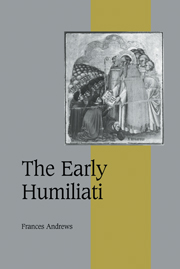Book contents
- Frontmatter
- Contents
- Acknowledgements
- List of abbreviations
- Map
- Introduction
- 1 Tradition and history
- 2 The beginnings of the Humiliati: the twelfth-century evidence
- 3 Quia in nullo peccabant: the inspection and approval of the Humiliati 1199–1201
- 4 Rules
- 5 In search of communities
- 6 New members and profession of vows
- 7 Unity and uniformity: the development of a centralised order
- 8 The Humiliati and the Church in the localities
- Conclusion
- Appendices
- Bibliography
- Index
- Cambridge Studies in Medieval Life and Thought: Fourth Series
4 - Rules
Published online by Cambridge University Press: 02 November 2009
- Frontmatter
- Contents
- Acknowledgements
- List of abbreviations
- Map
- Introduction
- 1 Tradition and history
- 2 The beginnings of the Humiliati: the twelfth-century evidence
- 3 Quia in nullo peccabant: the inspection and approval of the Humiliati 1199–1201
- 4 Rules
- 5 In search of communities
- 6 New members and profession of vows
- 7 Unity and uniformity: the development of a centralised order
- 8 The Humiliati and the Church in the localities
- Conclusion
- Appendices
- Bibliography
- Index
- Cambridge Studies in Medieval Life and Thought: Fourth Series
Summary
…according to God and your institutio approved by the Apostolic See…
The key to understanding the daily life of any regular community lies in the rule or rules adopted and the customs evolved to supplement and refine them. Thus the rule of Benedict is the fundamental guide to the monastic life embraced by innumerable religious communities in the medieval Latin West, but the details of daily observance for particular Benedictine houses are to be found in customaries, in the occasional dispensations of papal letters or in the constitutions issued by chapter meetings and other legislative authorities. Similar regulatory texts could be listed for each of the great orders of the middle ages.
By contrast, there seem to be no extant customaries or constitutions for the early thirteenth-century order of the Humiliati and much therefore remains elusive. There is nonetheless a parallel group of linked normative texts: on one hand the papal correspondence of June 1201 and later and on the other a rule of life or institutio. The use made of these texts is not, however, clear cut and requires further investigation before we can hope to understand the details of daily observance. In order to simplify this investigation, this chapter concentrates first on the situation prescribed at the beginning of the thirteenth century. In a separate section at the end it then gives brief consideration to the evolution of regulations concerning oath-taking, fasting and diet, three essential elements of observance.
- Type
- Chapter
- Information
- The Early Humiliati , pp. 99 - 135Publisher: Cambridge University PressPrint publication year: 2000



